Church Forsaken by Jonathan Brooks

Author:Jonathan Brooks
Language: eng
Format: epub
Tags: church;community;community service;neighborhood;Christian Community Development;CCDA;place;theology;Chicago;Englewood;south side;south side of chicago;chicago church;south side of chicago church;englewood church;inner city;inner city church;urban church;urban christian;urban development;social justice;beloved community;Jeremiah 29;pastah j;local church;community development;church and community;poverty;poor neighborhood;bad neighborhood;michael curry;black church context;hip hop culture
ISBN: 9780830873715
Publisher: InterVarsity Press
Published: 2018-09-15T00:00:00+00:00
PLACE IS OUR IDENTITY
Throughout the Bible we see that people are often identified by their places. It is common for biblical characters to be referred to by their names and their places of origin: children of Israel, Jesus of Nazareth, Saul of Tarsus. The angels even address the disciples as âmen of Galileeâ in Acts 1:11. In modern American society, most people are disconnected and transient, identified by a myriad of characteristics (class, age, race, gender, etc.) but rarely by the places we live. I refer to this as âliving above place.â When Jeremiah speaks to the exiles, he encourages them to marry and have sons and daughters and to increase there and not decrease. He desires for their families to become invested in Babylon. Living out Jeremiah 29 means that generationally you become more rooted in a community. Your family name and values become more embedded in that community. Whenever I introduce myself to someone, one of the first things I say is that I live on the South Side of Chicago in the Englewood neighborhood. For me this is simply because I am unable to share my story without making my place central. It is a matter of discipleship. I love the place too much. I donât just want to be known as Jonathan Brooks. I am Jonathan Brooks of Englewood.
From the Old Testament to the New Testament we see that the identity of Godâs people is attached to where they are from or where they are going. Place is valued by God, and connection to Christ does not mean disconnection from place. We are told to root ourselves in a place and encouraged to be witnesses for God there. To prepare ourselves to be witnesses, we must know the history, demographics, assets, and needs of the places God sends us. Jesus expects us to do the work of learning and loving our places so that we can best witness to his love there. Jesus himself lived as an example of what we are asked to do.
In John 4 we find the well-known story of the woman at the well. This story has often been used, especially in Christian community development circles, to discuss empowerment and the recognition that everyone has capacity. This is a positive and appropriate use of the story. But I would like to focus on the events that led up to this encounter, to speak to valuing places that have been forsaken.
Prior to the interaction with the woman, Jesus and his disciples are fleeing from Judea back north to Galilee. The religious leaders had gotten wind of the fact that Jesus was making and baptizing more disciples than John the Baptist. They were already after John and would soon imprison and kill him for his actions. John has identified Jesus as the Messiah and the Son of God, and now Jesus needs to head back home for a little while to retreat from all the opposition. The difference between this journey and the many
Download
This site does not store any files on its server. We only index and link to content provided by other sites. Please contact the content providers to delete copyright contents if any and email us, we'll remove relevant links or contents immediately.
| Business School Guides | GMAT |
| Guides | Interviewing |
| Job Hunting | Job Markets & Advice |
| Resumes | Vocational Guidance |
| Volunteer Work |
The Motivation Myth by Jeff Haden(5202)
Audition by Ryu Murakami(4919)
Adulting by Kelly Williams Brown(4561)
The Confidence Code by Katty Kay(4244)
A Mind For Numbers: How to Excel at Math and Science (Even If You Flunked Algebra) by Barbara Oakley(3293)
Waiting in the Wings by Melissa Brayden(3207)
Self-Esteem by Matthew McKay & Patrick Fanning(3132)
Fooled by Randomness: The Hidden Role of Chance in Life and in the Markets by Nassim Nicholas Taleb(3103)
The ONE Thing by Gary Keller(3057)
Nice Girls Don't Get the Corner Office by Lois P. Frankel(3034)
The Dictionary of Body Language by Joe Navarro(2986)
How to be More Interesting by Edward De Bono(2787)
Designing Your Life by Bill Burnett(2728)
Getting Things Done by David Allen(2688)
The Plant Paradox by Dr. Steven R. Gundry M.D(2599)
Police Exams Prep 2018-2019 by Kaplan Test Prep(2537)
What Color Is Your Parachute? 2015 by Richard N. Bolles(2299)
Dangerous Personalities by Joe Navarro(2281)
When to Jump by Mike Lewis(2239)
